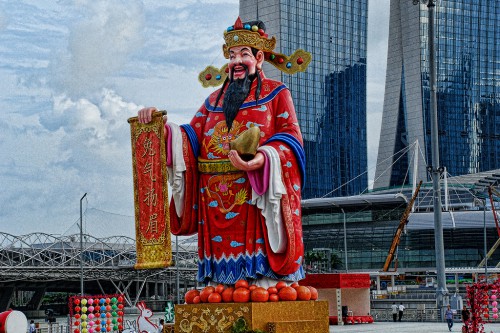4th September 2014 Singapore
Introducing the SE Asia Prosperity Fund Programme
Welcome to a blog about the South East Asia Prosperity Fund Programme. Since joining the programme in 2012, I’ve quickly come to realise how tricky it is to explain what the Prosperity Fund does. Explaining it to a Singapore audience makes it doubly hard.
Why? That’s because I’m up against this guy in terms of mind-share…

God of Prosperity ‘财神爷’
The word ‘Prosperity’ in this part of the Chinese diaspora bears strong cultural reference to ‘财神爷’ the Chinese god of Prosperity. Traditionally, the God of Prosperity is depicted holding a huge tael of gold and a scroll, but you sometimes get variations of him ditching the scroll for more gold – to symbolise his overflowing wealth.
Add in the references to money and wealth implied by the fund, and you end up with the image of him and his overflowing taels of gold popping into people’s minds whenever the Prosperity Fund is mentioned.
It also doesn’t help that the God of Prosperity is a mainstay during Chinese New Year celebrations (he gets a huge statue every year!), which ironically is also the period where I am fielded the most questions about what I do by my relatives.
So explaining that I work in the British High Commission on the Prosperity Fund never fails to elicit a ‘Huat ah!’ (loosely translated to mean ‘striking it rich’ – a reference to the God of Prosperity); or the occasional joke about how working for the God of Prosperity means I now don’t need to receive ‘red packets’ (traditional gifts of money) anymore!
What the Prosperity Fund is about
Even after getting past the references and jokes, explaining what the Prosperity Fund does is still an uphill task. Talking about the Fund’s goal to ‘Create the conditions for global growth’ usually gets me a polite but confused nod in response.
Elaborating that the Fund provides development aid to countries in the region, by funding technical assistance/capacity building on the issues of Climate Change, Energy Security, Economic Development and Trade Policy generates some interest and further questions on why the UK supports work in these areas.

It is only when I delve deeper into specific examples do I get that light bulb moment. However, that means explaining about:
- Projects in Thailand that help government officials study the policy options available for them to encourage the private installation of rooftop solar PV; or
- Projects in Indonesia that share the UK experience in developing and deepening liquidity in the government bond market; or
- Projects in Vietnam that provide technical assistance in the implementation of carbon emission reduction targets; or
- Projects in Malaysia that build awareness amongst stakeholders on issues such as government transparency.
Which as you can appreciate, is a mouthful and too serious a topic amidst the ongoing festivities.
You can see the look of painful relief on my dear aunt’s face at this stage. Her patience has paid off, and though she still doesn’t quite grasp the full extent, she feels knowledgeable enough to pass this nugget of information.

But ultimately, it’s like playing a game of broken telephone with your relatives. Two weeks later, I overhear another relative state authoritatively that so and so’s son (she’s referring to me) works in the British Council.
What I hope this blog does
I hope this blog does three things. I hope it gives you a flavor of the type and nature of work the Prosperity Fund does in the region.
Secondly, I hope that the collection of examples of projects that will soon feature on this blog initiates a discussion on the work the Prosperity Fund does – which hopefully becomes a valuable source of feedback and suggestions.
Lastly, and more selfishly, I hope to save my relatives the trouble of figuring out what I do, and lay to rest the whole misunderstanding about the British Council once and for all.